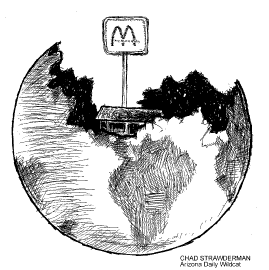![]()
![[ OPINIONS ]](/images/fall97/opinionsf97.gif)
![]()
By Brad Senning
Arizona Daily Wildcat November 10, 1997
McDonald's Silences its Critics
![[Picture]](05_1_i.gif)
Brad Senning |
Many years later, as he faced the McDonald's libel attorneys, columnist
Bradford Senning was to remember that distant afternoon when he had his
first green Shamrock Shake. His relationship with McDonald's was always
a lucky one.
Today, writing this column about McDonald's puts me in a spot of liberty and constraint. Liberty because the corporation has been accused of so many indiscretions I almost had to design a lottery system in order to choose a single one to write about. Constraint because McDonald's would prefer, at any given moment, to be suing the living pants off anyone who chooses to take issue against them.
But we can plow through the crap here: McDonald's doesn't belong on campus and we need to grease the wheels that will ultimately carry it away.
A college campus is not only a place of higher education, but of free expression. By inviting McDonald's to campus, we are supporting a business which has historically silenced its critics. They actively quash individuals' rights to speak freely.
In 1995, a group of vegetarian activists called Vegan Action, in Berkeley, Calif., created a parody T-shirt to get their message out. The T-shirt, which used the golden arches logo and the name McVegan, had as its punch line "Billions and Billions Saved."
McDonald's responded with an ultimatum that McVegan halt all production, send them the sales invoices of all T-shirts sold and send all remaining T-shirts to McDonald's Corporation, or "... we will have no alternative but to immediately refer this matter to our outside lawyers for immediate action."
McDonald's also contacted the UC Berkeley "Bear Student Store" (their version of our UA Bookstore) who was a major distributor of the McVegan T-shirt. McDonald's informed them that the T-shirt was a trademark infringement, so the bookstore stopped selling them.
McDonald's contended the T-shirts constituted a trademark right infringement. Legally, they had no grounds for a lawsuit because the T-shirts were a social commentary and McDonald's does not have the right to prohibit third-parties from conjuring this image if it's used as a form of parody or critique.

But McDonald's would rather threaten a lawsuit because it usually causes contrition on the part of those who would be critical of them. McDonald's has a lot of legal muscle. It's hard to question their power when you're a nonprofit organization like Vegan Action. But Vegan Action was able to obtain legal counsel and maintain their right to produce the T-shirt.
Others haven't been so lucky.
In 1991, playwrights Steve Brown and Jenny Fraser, writing for a children's theater in Glasgow, Scotland, created the play "MacBurgers: Real Neat Scotch Fare." The play was written as a fictitious satire of the hamburger industry and never mentioned McDonald's specifically.
On the day the play was to open McDonald's requested a copy of the script and found "twenty one quotations or references" which seemed to them directly critical of McDonald's. "The play," their lawyers wrote, "is riddled with political and defamatory anti-McDonald's propaganda." Threatened with legal action, the authors had to take part in a legal undertaking. They had to promise the play would only show for two nights and never be performed again.
The authors were backed into a corner. They didn't have access to the sort of legal representation it would have taken to fight McDonald's, so they signed the undertaking McDonald's handed to them. They let McDonald's impinge upon their artistic freedom.
In 1989, author Karen Christiansen, in an environmental handbook entitled Home Ecology: Making Your World a Better Place, wrote about the destruction of tropical rain forests, the pollution of plastic and paper waste, the profusion of unhealthy food and the tendency of cultural homogenization caused by "international hamburger chains." Without naming a specific chain, Christiansen hoped to raise awareness about the consequences of patronizing fast-food restaurants. McDonald's, who is always leery of implicit attacks and who never shrinks away from such intimidating foes as handbook authors, demanded the immediate withdrawal of the book from bookshelves, the earnest and public apology of its author and the promise that she would never again defame McDonald's.
McDonald's knows the individuals it threatens aren't capable of challenging them in court, which is why they threaten their critics so frequently. McDonald's has created a Big Brother regime, capable of silencing seditious, anti-McDonald's propaganda.
We can't let our campus support this kind of censorship.
The UA is a place where ideas are challenged. And our basic right of free expression is rarely questioned. McDonald's stands for oppression, which we expect when we go out into the real world - that world we visit when we step across Speedway - but not on campus, where unique individual style takes precedence over corporate conformity. In such a space as ours, McDonald's has no place.
Remember me as I stand in front of the libel marksmen. Remember those who came here before me. Our relationship with McDonald's is only as lucky as our silence permits.
Brad Senning is a senior majoring in American literature and creative writing.



